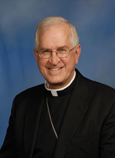Hope in the Lord — Christ Making an Impression
September 6, 2012

This summer I met two fine priests. The first, Father Jeremy Driscoll, is a Benedictine priest from Oregon who will be with me in Rome for the synod. I met Father Driscoll at a preaching seminar at the University of Notre Dame in late June. I looked him up on the Internet and found a great YouTube video of his presentation on Mass participation.
Father Driscoll’s theme was simple but powerful: We have become so accustomed to “expressing ourselves” that we bring this attitude to Mass.
C.S. Lewis claims that this penchant for self-expression can be traced to the early 1800s when the Enlightenment took root and people began to search their feelings to discover their own truths. The relativism of our age (i.e., “my truth is not your truth”) is the result, and, though feelings are good and necessary, they are not the sole or even the best foundation upon which to base one’s life.
Father Driscoll’s point was that true participation at Mass emerges from an openness to being impressed by Christ. We come to the Holy Eucharist so that Jesus Christ in his one sacrificial act of saving love might change us, both as a community and one person at a time. We seek not to express but to be impressed.
I encountered the same theme when I met Father Michael Sherwin in July at the Thomistic Institute held at St. Louis Bertrand. Father Sherwin is a Dominican moral theologian who teaches in Freiburg, Switzerland. He visited Louisville to speak to about 100 priests who were seeking to become better confessors.
Father Sherwin discussed the theme “expression,” which in its most shallow form is simply acting on impulse (e.g., “Just do it!”) and represents not freedom so much as license, which is an irresponsible blindness when it comes to virtue, responsible behavior and happiness.
He told us we may be surprised by what is behind the “expression” of people who seem so spontaneous and successful and used the example of jazz improvisation. In the French Quarter in New Orleans, you can hear musicians seemingly “doing their own thing” and creating new music. The same movement developed during the Baroque era and was called “orchestration.”
Father Sherwin pointed out that what is not seen is what jazz musician Dave Brubeck called “freedom within tremendous discipline.” Study and long hours of practice make carefree and lively jazz. Many great artists consistently transcend self-expression to find some inspiration beyond them.
There are very practical implications to our understanding of how to express ourselves. When we view expression as “license” or the ability to act on instinct or desire without much thought or discipline, we are led to a spontaneity that is deprived of substance and depth. Virtue that leads to good habits, on the other hand, results from thinking about our behavior and its consequences and then acting responsibly.
“License” can be seen in sexuality as people live together without public commitment, give up on the promises of marriage or enter into a sexual relationship as a first step in getting to know someone or simply to enjoy the pleasure of it all. “License” can be seen in the way we live when money and possessions become paramount and greed becomes rampant. Knee-jerk decisions in any of these areas of life rob us of the depth that good decision-making provides.
You hear it said that we are the freest and yet, in many cases, the most restless and unsatisfied generation. The culprit is our skewed understanding of freedom. Freedom does not result from unbridled impulses being acted upon without consideration of the effects on others and the consequences in our lives. When there are no standards, we are at sea without an anchor.
The practical implications of a thoughtful approach to life also apply to voting. I join my brother bishops in avoiding partisanship. I will not tell you how to vote, nor should I. Instead, I recommend that you take the time to study and develop a well-formed conscience, and the Faithful Citizenship document from the USCCB is a great aid to this process (see www.usccb.org/issues-and-action/faithful-citizenship/).
When I speak this week at the University of Notre Dame roundtable on “Being a Person of Faith in a Pluralistic Democracy,” one clear message will be the importance of conscience formation and the ability to understand intrinsic evils that are always wrong — examples include racism and abortion — versus other important issues in which people of good will can reach different legitimate conclusions.
As people of faith, when we vote we must look beyond what will benefit only our own lives to the common good. The Faithful Citizenship document provides a solid foundation on what the common good really means.
On Sept. 8, the birthday of the Blessed Virgin Mary, we honor a woman who, in her holiness, made being a saint look so easy. May Mary, our Mother, lead us to habits of the heart so that her son, Jesus, might impress us now and forever.




